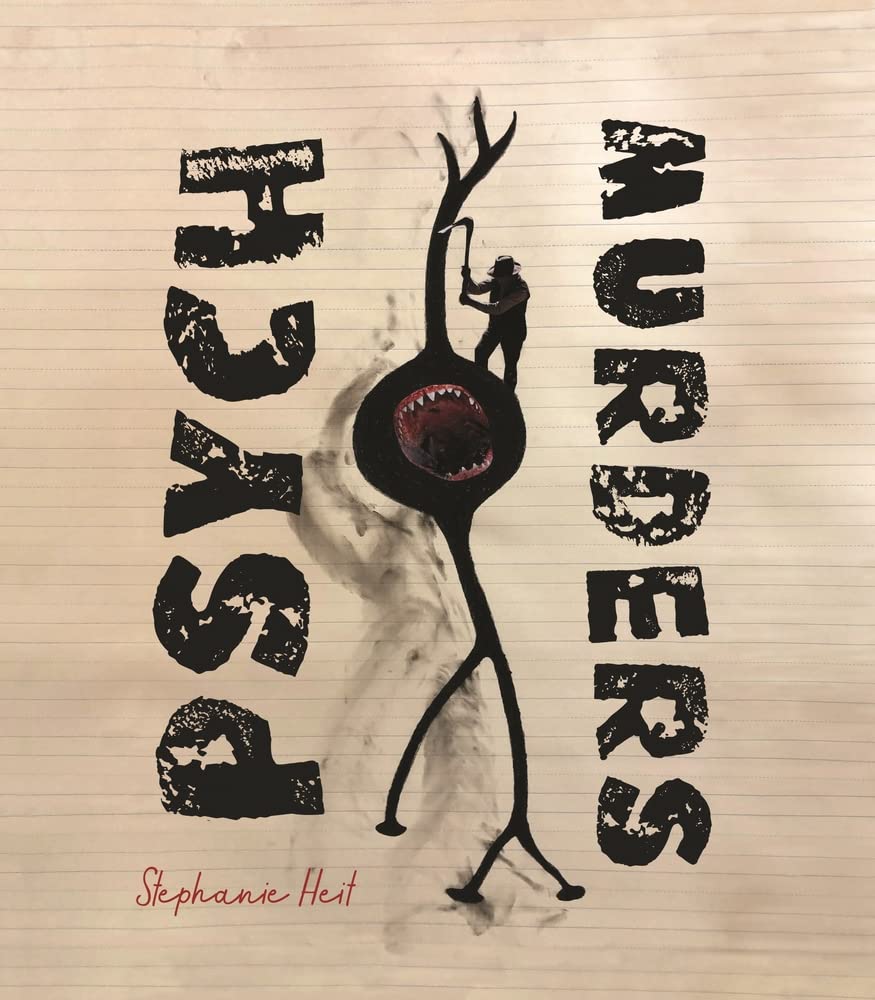Stephanie Heit’s hybrid memoir poem blasts the page electric and documents her experience of shock treatment. Using a powerful mélange of experimental forms, she traces her queer mad bodymind through breathlessness, damage, refusal, and memory loss as it shifts in and out of locked psychiatric wards and extreme bipolar states. Heit survives to give readers access to this somatic, visceral rendering of a bipolar life complete with sardonic humor, while showing us the dire need for new paradigms of mental health care outside closets, attics, prisons, and wards. Psych Murders adds a vital layer of lived experience of electroshocks and suicidal ideation to the growing body of literature of madness and mental health difference.

Book cover art: “What I have learned (Bipolar Neuron)” by Chanika Svetvilas
Wayne State University Press, 2022, Made in Michigan Series
Awards
- Midwest Book Award Gold Medal for Poetry
- Independent Publisher Book Awards (IPPY) Bronze Medal
- Next Generation Indie Book Award Finalist
- Eric Hoffer Book Award Finalist
- Heartland Booksellers Award Finalist
- Sundress Publications’ The Wardrobe’s Best Dressed
Poems from PSYCH MURDERS
- “ETC. The Resistance” at Poetry Foundation
- “Admission Threshold,” “Turtle,” “Dear Murderer” at poemoftheweek.com
- “Testament” in Disability Studies Quarterly (text and audio)
- “Mad Flora and Fauna Catalog” in Zoeglossia poem of the week (text and audio)
- “My Own Sensorium: Poems and Field Notes from Psych Murders” in In Corpore Sano
- “(in)voluntary” in Rogue Agent
- “Solar Eclipse” in Zoeglossia poem of the week (text and audio)
- “Tell Yourself,” “Murderer shows up,” “I don’t remember that picture,” “The navigational chip,” “The Classifieds: Bipolar Girls on a Manic High are my Addiction” in The Wardrobe’s Best Dressed
Essay “Disability as a Creative Practice” in Mad in America
on the process of writing PSYCH MURDERS and embracing bipolar as an artistic practice

“I wanted to explore how time and sequence work when memory is disrupted, in my case due to traumatic brain injury. I needed to document and reclaim my own sensorium. To take back the language used by medical people to write their version of my story. To write my own narrative.”
“Bipolar is a creative practice for me. It is integral to who I am (as is being a poet and dancer), how I move through the world, what I notice, and to what intensity.”
Mad Flora and Fauna
a video/movement/poem composed of lines from PSYCH MURDERS by Stephanie Heit & Charli Brissey. Part of Accelerants: An Action Books Poetry Film Series.
PSYCH MURDERS book launch
Reviews
“Psych Murders is a powerful and disturbing book. Building upon the tradition of “nothing about us without us” within disability literature, Heit’s poems allow those who actually live with disability to speak for themselves.”
—Michael Northen in Wordgathering, link to full review here
“In Psych Murders, Heit invites the reader into her innermost world. No matter the readers’ experience with mental health (and the mental health system in the U.S.), they’ll be able to learn and better understand the challenges that bipolar people and those who experience suicidal ideation face. Although the speaker tells The Murderer, “You crowd out beauty,” the beauty of Heit’s words, observations and rhythms make this poetry-memoir hybrid an important and revelatory book.”
—Liz DeGregorio in ANMLY, link to full review here
“Psych Murders carves out a possibility for a different kind of bodymind health practice where desire and care might find a different mode of expression.”
—Orchid Tierney in The Florida Review, link to full review here
“Within these poems, Heit skillfully shows us how language can save or kill. Heit reminds us that we still have agency. And that getting help should never negate one’s power. That we can resist, find support, and survive.”
—Kara Dorris in Heavy Feather Review, link to full review here
“This collection is not only stunning but vital. Heit has created a border-crossing collection for survivors of psychiatric systems, disability and Mad studies scholarship, and anyone interested in imagining new, person-centered frameworks for taking care of each other during crisis and beyond.”
—Kora Dzbinski in Journal of Literary & Cultural Disability Studies, link to abstract here
Interviews & Podcasts
PSYCH MURDERS podcast from All Write in Sin City
“Pushing Limits” with Mark Romoser on KPFA Radio Station, conversation about PSYCH MURDERS
“The Poetry Show” with Daphne Stanford on Radio Boise, conversation and reading from PSYCH MURDERS
“Crafting Madness: Stephanie Heit on Joining a Lineage of Authors with Mental Health Difference” Naomi Ortiz talks to the Author of PSYCH MURDERS in Literary Hub.
Interview in Pulp with Martha Stuit: “PSYCH MURDERS Examines Shock Treatment, the Aftermath, and How Time and Memory Move in Unexpected Ways”
Interview in Voyage Michigan about an amphibious childhood, mental health difference, PSYCH MURDERS, Turtle Disco, and disability culture love.
Praise
“This is a brilliant book of poetry-memoir-witness that crosses many borders and shines a naked and daring light on the horrors of psychic suffering at critical levels beyond the pale of endurance. Stephanie Heit transforms her horrors and scars into a palpable wisdom to benefit others in this magnificent testament to love and survival. She is a starling word- and world-worker and a compassionate, original voice in the wilderness. I bow at her investigative bravery, the loneliness of the journey. ‘The brain as abandoned city that just needs some light’ is a searing analogy we should all wake up to recognize.”
—Anne Waldman, poet, chancellor emeritus of the Academy of American Poets, author of Trickster Feminism
“With tender consideration in the midst of profound psychic pain, Heit guides readers through the journey of psychiatric treatment to confront the ‘murderer’ in the mind. Suicidal ideation ‘crowds out beauty,’ but these poems are lucidly crystalline songs of light; not the doctor’s interrogative glare but lanterns shining us home.”
—Roxanna Bennett, author of Unmeaningable & The Untranslatable I
“Psych Murders is a deeply felt and known work of somatic writing. Stephanie Heit is a writer who does not look away from ‘so much unknown,’ inhabiting the ‘blur’ and ‘the beauty’ in equal measure. How do we write when we\’re exhausted? Or: How do we survive the book? Heit answers these questions with radical care and visceral acuity, in all weathers.”
—Bhanu Kapil
“Psych Murders is a tightly woven and lyrical exposé of the flexibility and failure of language when it remains an accomplice to our collective socialization under ableism. This is necessary and dangerous work, and it is a stunning addition to the crip canon.”
—Meg Day, author of Last Psalm at Sea Level
“Stephanie Heit’s Psych Murders bears witness to shock treatments, psychiatric wards, and medical interventions. Here suicidal ideation takes the life of an inner murderer, personified. This hybrid lyric memoir pulls no punches. ‘I play with pills, pistols, plastics. In my mind. Siren red. Maize and blue of the University Hospital where everyone knows my name.’ Harrowing and brave; illuminating and haunting.”
—Hoa Nguyen, author of A Thousand Times You Lose Your Treasure
“Drawn from the vivid, hallucinatory medical notes Stephanie Heit took during inpatient treatment, Psych Murders opens with addresses to the Psych Murderer, a sociopathic bureaucratic persona that feels like an internalized form of the institution: ‘You live invisible in the blur of my eye.’ The psychiatric institutional setting—with its clinical apparatuses of electroshock treatment—‘architected to increase anxiety,’ restructures the body and Heit’s lines into alternative choreographies, the twitch of synaptic decoherence. The body incorporates the sum total of its treatments and diagnoses—and is a ‘DSM-V masterpiece,’ which can also be said of the book itself, a devastating and exhilarating read!”
—Vidhu Aggarwal, author of The Trouble with Humpadori and Daughter Isotope